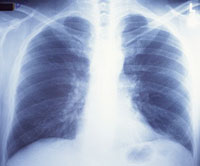X-rays may cause breast cancer
Lead researcher Dr David Goldgar said: "This is one of the first studies to demonstrate that women genetically predisposed to breast cancer may be more susceptible to low-dose ionizing radiation than other women.

The BRCA 1 and 2 genes make proteins involved in repairing damage to DNA in breast cells. Mutations to these genes, which affect more than one in 500, leave women with a 40 to 80 per cent chance of developing breast cancer at some point in their lives, Scotsman reports.
Women who were exposed to X-rays before age 20 had a 2.5-fold increased risk of developing the disease before age 40, compared with women who had never been exposed.
Dr Goldgar said BRCA proteins played a key role in repairing damage in breast cells.
Thus, women carrying mutated versions of the genes which control their production may be less able to repair any damage associated with exposure to the ionizing radiation emitted by X-rays.
Dr Laura-Jane Armstrong, of the charity Cancer Research UK, said: "Although interesting, the results of this study are not conclusive.
Goldgar, who is now at the University of Utah, pointed out that most of the chest X-ray risk in the study affected younger women, and that even high-risk women don't start having mammograms until they are in their 30s, according to the Forbes.
Subscribe to Pravda.Ru Telegram channel, Facebook, RSS!





